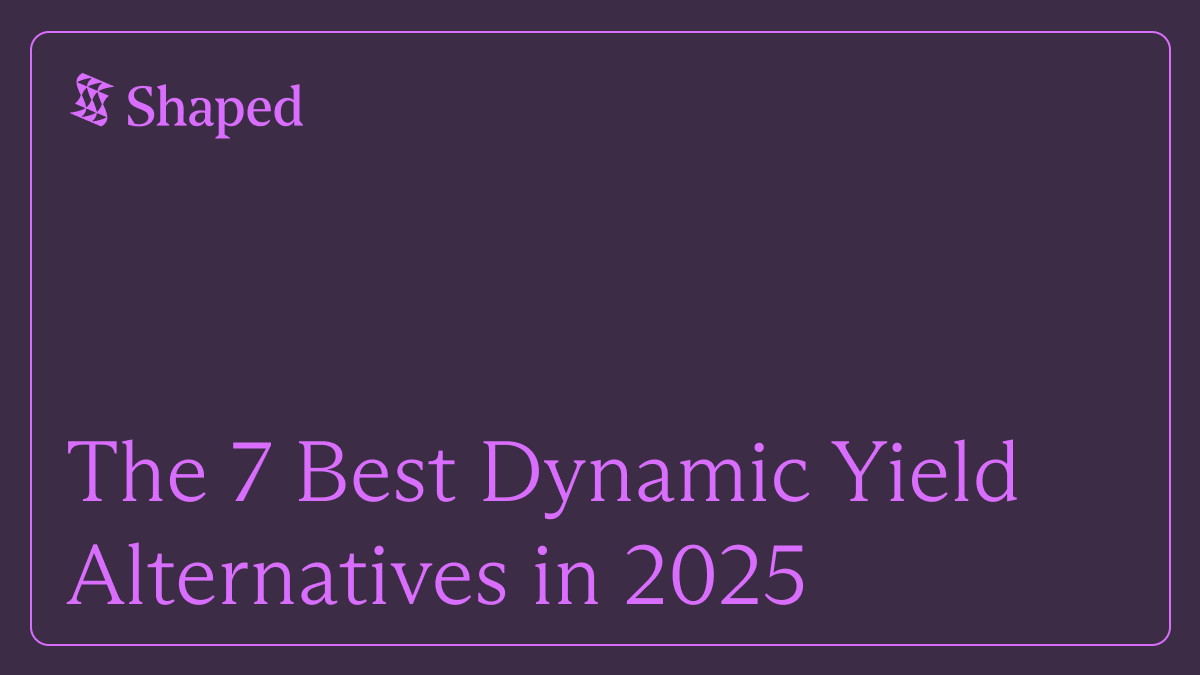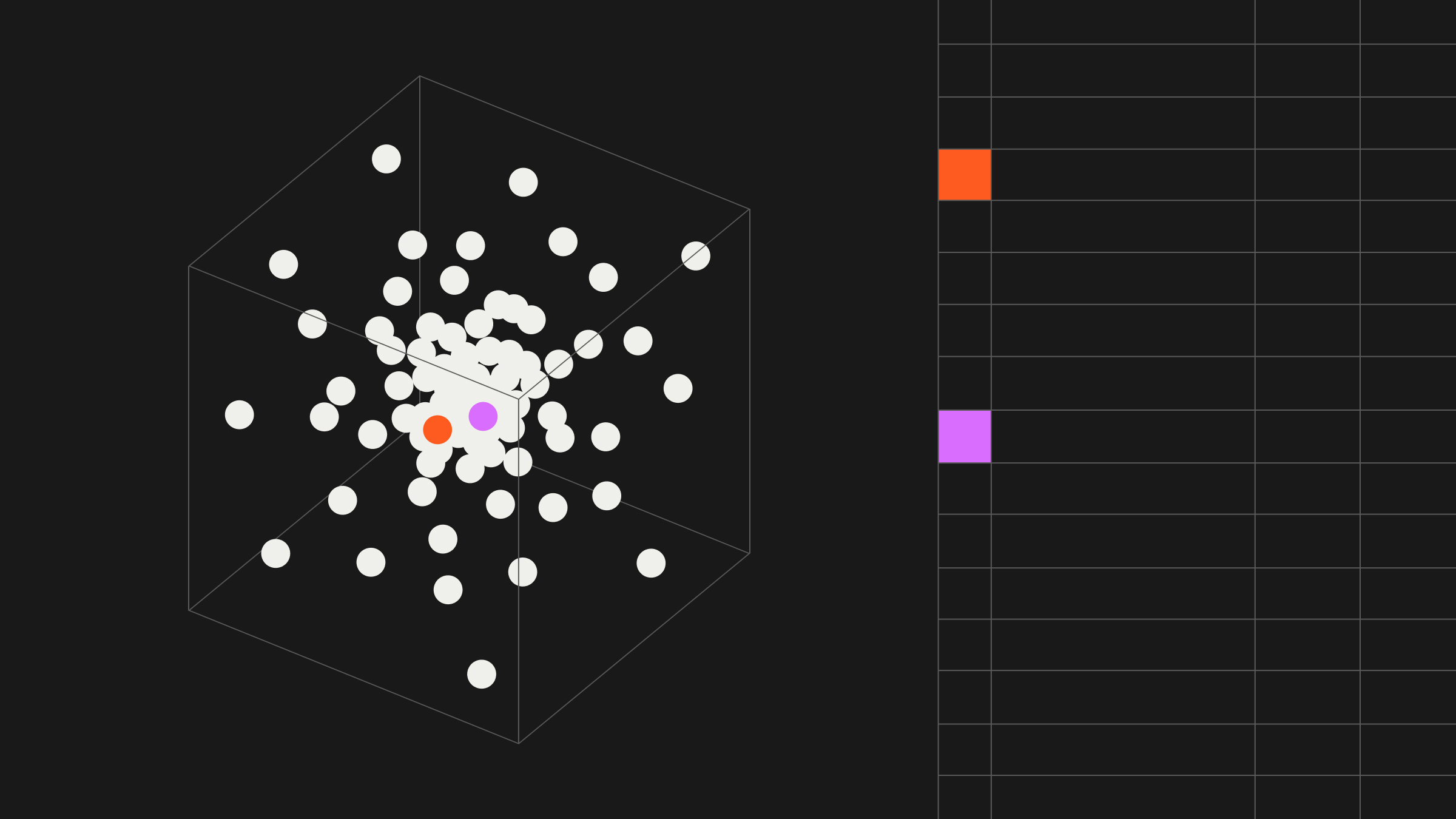But in 2025, many product and growth teams are rethinking Dynamic Yield because:
- It’s heavyweight to implement (often requiring long onboarding and consulting support).
- It’s marketer-first, not ML-first — more rule-based personalization than real-time machine learning.
- It can be costly for mid-market companies that don’t need the full enterprise suite.
If you’re searching for the best Dynamic Yield alternatives, you’re likely looking for a solution that is:
✅ Easier to implement
✅ More transparent and ML-native
✅ Better suited for real-time personalization across search + feeds + recs
✅ More cost-effective without sacrificing sophistication
Below, we break down the top 7 Dynamic Yield alternatives in 2025 — with Shaped leading the way.
1) Shaped
Shaped is an AI-native personalization platform built from the ground up by recsys veterans to handle real-time recommendations, feeds, and search. Unlike Dynamic Yield’s marketer-first approach, Shaped is ML-first — designed for data-driven product and engineering teams that need personalization to power the product experience itself.
Why It’s the Best Dynamic Yield Alternative:
- Unified discovery: Handles search + recs + feeds together (vs. siloed Dynamic Yield modules).
- Value Modeling: Blend multiple KPIs (engagement, conversions, revenue, diversity, freshness) at inference time — without retraining.
- Warehouse-native: Direct connectors to Snowflake, BigQuery, Redshift, and Segment. Transparent SQL transforms instead of black-box data pipelines.
- Real-time learning: Updates relevance within a session. Perfect for fast-moving feeds, marketplaces, or e-commerce.
- Proof of lift: Customers like Trela increased AOV by 16% with intelligent upsells and “related items.”
👉 If you’re frustrated by the complexity or rule-heavy approach of Dynamic Yield, Shaped gives you ML-native power with developer-friendly transparency.
Pricing: Usage-based monthly (contact Shaped).
2) Algolia AI
Algolia is best known for search, but its AI add-ons extend into recommendations. If you already use Algolia Search, its recs API is a quick add-on.
Strengths
- Strong developer ecosystem.
- Easy Shopify/Adobe integrations.
- Fast time-to-value for simple recs.
Limitations
- Search and recs are separate products (less unified intelligence).
- Less control over ML pipeline compared to Shaped.
3) Bloomreach Discovery
Bloomreach is an e-commerce–focused personalization suite that blends search + product discovery + merchandising.
Strengths
- Commerce-optimized ranking tuned for revenue.
- Strong merchandising dashboards.
Limitations
- Geared toward retailers (less useful for social/media feeds).
- Less transparent ML, more marketer-facing than engineer-facing.
4) AWS Personalize
Amazon Personalize is AWS’s managed recsys API. It’s appealing if you’re already deeply invested in AWS infrastructure.
Strengths
- Fully managed training/hosting.
- Scales easily within AWS stack.
Limitations
- Recommendations only (no search/feeds).
- Recipe-based, less flexible than Shaped or Bloomreach.
- Cold-start handling is limited compared to newer ML-native platforms.
5) Coveo
Coveo is an enterprise AI search platform with personalization layers for commerce and knowledge management.
Strengths
- Federated search across multiple content systems.
- Enterprise-ready governance + analytics.
Limitations
- Search-first, not recommendations-first.
- Less experimentation depth compared to Shaped or Dynamic Yield.
6) Recombee
Recombee is a developer-friendly recommendations API with transparent pricing and strong real-time learning.
Strengths
- Clear usage-based pricing.
- Flexible APIs for multiple rec types.
Limitations
- Recs-only (no search or feeds).
- Lighter on experimentation dashboards compared to Dynamic Yield.
7) Constructor.io
Constructor.io is a commerce-focused discovery platform that mixes search, browse, and recommendations.
Strengths
- Strong in e-commerce, particularly large catalogs.
- Merchandising-focused.
Limitations
- Less flexibility for non-retail use cases.
- Heavier implementation than API-first solutions.
Key Takeaway
If you like Dynamic Yield’s omnichannel marketer workflows, it’s still a fit for some large retailers. But if you want real-time, ML-native personalization that powers the product experience itself, then Shaped is the best Dynamic Yield alternative in 2025.
With unified search + recs + feeds, transparent SQL transforms, and Value Modeling for business-aware objectives, Shaped is purpose-built for teams that want both speed to value and deep control over personalization.
FAQs: Dynamic Yield Alternatives
What is Dynamic Yield best known for?
Dynamic Yield is best known for its marketer-focused personalization suite, which includes A/B testing, audience targeting, and omnichannel content personalization. It’s widely used by large retailers and brands for campaign-driven personalization.
Why would I look for Dynamic Yield alternatives?
Teams often seek alternatives because Dynamic Yield can be complex and costly to implement, and it’s rule-heavy compared to modern AI-native platforms. If you’re looking for real-time ML-driven personalization instead of marketer-only workflows, you’ll likely need something different.
Which is the best alternative to Dynamic Yield?
For product-led teams, Shaped stands out. It unifies search, recommendations, and feeds into one ML-native engine, with transparent SQL transforms and Value Modeling. This makes it much more adaptable and measurable than rule-based systems.
How does Shaped compare to Dynamic Yield on implementation speed?
Dynamic Yield often requires long onboarding and external consulting. Shaped is warehouse-native, meaning it connects directly to your Snowflake/BigQuery and starts learning in days, not months.
Is Dynamic Yield better for marketers than Shaped?
Yes, if your primary users are marketing teams running A/B tests and audience targeting, Dynamic Yield’s visual tools may be a fit. But if personalization is core to the product (like feeds, search, recommendations), Shaped is a better choice.
Do Dynamic Yield alternatives handle cold-start better?
Yes. Platforms like Shaped leverage semantic embeddings + transfer learning to deliver relevant results from day one, even with new users or new items — something Dynamic Yield is weaker at.
What kind of companies should use Shaped over Dynamic Yield?
Marketplaces, social apps, streaming services, and e-commerce brands that want real-time personalization baked into the user experience — not just marketing campaigns — get the most out of Shaped.




